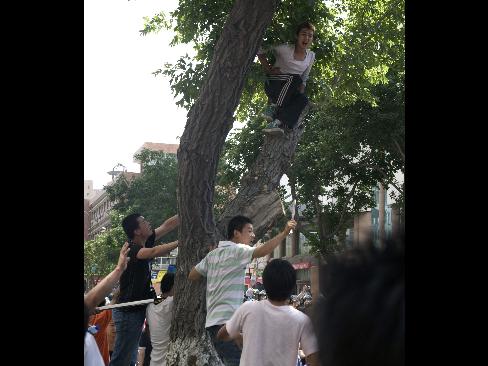
A young man who was mistaken for being a Uighur is chased by a mob of Han Chinese in Urumqi, China, on July 7, 2009. Photographer: Ng Han Guan/AP via Bloomberg News
July 8 (Bloomberg) — Hundreds of military police patrolled the western Chinese city of Urumqi, as the worst violence since last year’s uprising in Tibet prompted President Hu Jintao to cut short a trip to the Group of Eight summit in Italy.
Two days of rioting in the capital of Xinjiang, a province rich in oil and natural gas, left at least 156 people dead. At least 20 trucks of armed police assembled near the Hai De Hotel in Urumqi, where a press conference, scheduled for 1:30 p.m. local time, was postponed until 6:30 p.m.. The Xinjiang press office declined to confirm or deny that Hu will attend the event.
Hu’s decision to cancel participation in a gathering of leaders from the world’s biggest economies reflects how significantly China views internal challenges to its leadership. Hu had been expected to meet with U.S. President Barack Obama and others to discuss the global economic crisis.
Hu’s return “sends a message of seriousness,” said Phil Deans, a professor of Asia Studies at Temple University in Tokyo. “Some will certainly see it as a sign of weakness, and say that the Communist Party isn’t as strong as it used to be.”
Military police with rifles and trucks with water cannons set up on one of the main thoroughfares through the city that divides Muslim Uighur and Han neighborhoods to keep the two sides apart. A van with loudspeakers urged people to go home.
800 Injured
Officials last night imposed a curfew for a second day after Han and Uighurs fought in the streets with machetes, pipes and bricks, and police fired tear gas to break up the violence. More than 800 people have been injured since July 5.
Chinese stocks were little changed, with the Shanghai Composite index falling 0.3 percent to close at 3,080.77. The measure has risen 69 percent this year, the world’s best- performing major market.
“In the short term, I don’t see any direct impact on the financial markets,” said Fan Cheuk Wan, head of Asia Pacific research at Credit Suisse Private Banking in Hong Kong, which oversees almost $50 billion in the region. “The situation is pretty much contained, not having a major impact on the national economy, unless it spills over to other parts of China or triggers policy reversals.”
Persisting Grievances
The violence underscores persisting grievances among some Chinese minorities who complain of restrictions on religious and cultural practices. Beijing’s policy of investing in the restive territories of Tibet and Xinjiang has attracted more Han, who make up more than 90 percent of the country’s population.
Hu, 66, who was in charge of Tibet during riots there in 1989, hasn’t commented on the events in Xinjiang. Those riots
Dozens of Uighurs marched yesterday to demand the release of more than 1,000 people held by police following protests. Similar scenes played out across the city of 2.4 million people, Xinhua said. The strife followed a demonstration in Urumqi over the deaths of migrant Uighur workers in a June factory brawl in southern China.
Muslim Uighurs, who make up less than half Xinjiang’s population of 20 million, complain of discrimination and unfair division of the region’s resources. The landlocked region, about three times the size of France, has China’s second-highest oil and natural gas reserves and was the biggest cotton producer.
Separatists Blamed
China’s Foreign Ministry this week blamed foreign-based separatists for fomenting the riots, branding them terrorists and criminals. The riots were a premeditated attack, Qin Gang, a ministry spokesman, told a briefing in Beijing yesterday.
Police in Xianjiang said they have evidence that Rebiya Kadeer, an exiled Uighur activist living in the U.S., planned the demonstrations, Xinhua reported.
Kadeer, who heads the World Uighur Congress, denied any role in the riots, saying at a July 6 news conference in Washington that the only calls she made were to her children in Urumqi to ask them to stay home. The group is a Munich-based exile organization that seeks independence from China.
Police killed 400 Uighurs during the Urumqi riots, Kadeer wrote in today’s Wall Street Journal, citing unnamed Uighur sources in East Turkestan.
Mass Arrests
Authorities made mass arrests, deployed 20,000 security personnel and cut Internet and phone lines to stem the violence.
Li Zhi, chief of the Urumqi Communist Party, yesterday addressed the Han demonstrators from the roof of a car, urging them to disperse. Protesters attacked Uighur property, sang the national anthem and ripped down posters exhorting residents to preserve social harmony.
Protests spread to the Uighur-majority oasis town of Kashgar this week, Xinhua reported.
“The government feels that if they don’t control it immediately and harshly it will get out of control,” said Dru Gladney, president of the Pacific Basin Institute at Pomona College in Claremont, California.
The official death toll makes the violence the most deadly in decades, possibly since the Cultural Revolution in the 1960s.
To contact the reporter on this story: John Liu at [email protected]
Last Updated: July 8, 2009 04:10 EDT
Source: Bloomberg